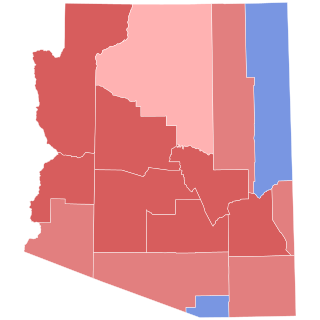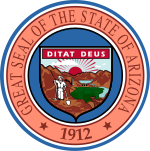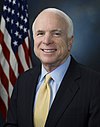
John David Hayworth Jr. is an American television host and former politician. He served as a Republican member of the United States House of Representatives from 1995 to 2007 from Arizona's 5th Congressional District. He currently hosts Newsmax Prime, a television news/talk prime time show that airs weekdays at 8:00 p.m. Eastern Time and 5:00 p.m. Pacific Time on Newsmax TV. Previously, he hosted a conservative talk radio program on KFYI in Phoenix until January 2010, when he resigned due to his run for the U.S. Senate.

The 1986 United States Senate elections were elections for the United States Senate. Held on November 4, in the middle of Ronald Reagan's second presidential term, the 34 seats of Class 3 were contested in regular elections. The Republicans had to defend an unusually large number of freshman Senate incumbents who had been elected on President Ronald Reagan's coattails in 1980. Democrats won a net of eight seats, defeating seven freshman incumbents, picking up two Republican-held open seats, and regaining control of the Senate for the first time since January 1981. This remains the most recent midterm election cycle in which the sitting president's party suffered net losses while still flipping a Senate seat.

The 1980 United States Senate elections were held on November 4, coinciding with Ronald Reagan's victory in the presidential election. The 34 Senate seats of Class 3 were contested in regular elections. Reagan's large margin of victory over incumbent Jimmy Carter gave a huge boost to Republican Senate candidates, allowing them to flip 12 Democratic seats and win control of the chamber for the first time since the end of the 83rd Congress in January 1955.

The 1974 United States Senate elections were held on November 5, with the 34 seats of Class 3 contested in regular elections. They occurred in the wake of the Watergate scandal, Richard M. Nixon's resignation from the presidency, and Gerald Ford's subsequent pardon of Nixon. Economic issues, specifically inflation and stagnation, were also a factor that contributed to Republican losses. As an immediate result of the November 1974 elections, Democrats made a net gain of three seats from the Republicans, as they defeated Republican incumbents in Colorado and Kentucky and picked up open seats in Florida and Vermont, while Republicans won the open seat in Nevada. Following the elections, at the beginning of the 94th U.S. Congress, the Democratic caucus controlled 60 seats, and the Republican caucus controlled 38 seats.

The 1968 United States Senate elections were elections for the United States Senate. Held on November 5, the 34 seats of Class 3 were contested in regular elections. They coincided with the presidential election of the same year. The Republicans picked up five net seats in the Senate. This saw Republicans win a Senate seat in Florida for the first time since Reconstruction.

The 1964 United States Senate elections were held on November 3. The 33 seats of Class 1 were contested in regular elections. Special elections were also held to fill vacancies. They coincided with the election of President Lyndon B. Johnson by an overwhelming majority, to a full term. His Democratic Party picked up a net two seats from the Republicans. As of 2023, this was the last time either party has had a two-thirds majority in the Senate, which would have hypothetically allowed the Senate Democrats to override a veto, propose constitutional amendments, or convict and expel certain officials without any votes from Senate Republicans. In practice, however, internal divisions effectively prevented the Democrats from doing so. The Senate election cycle coincided with Democratic gains in the House in the same year.

The Alaska Democratic Party is the affiliate of the Democratic Party in Alaska, headquartered in Anchorage.
Richard Kimball is an American politician who is the founder and president emeritus of the nonprofit voter education organization Vote Smart.

The 2008 United States elections were held on Tuesday, November 4, 2008, during the war on terror and the onset of the Great Recession. It was a considered a Democratic wave election, with Democratic Senator Barack Obama of Illinois defeating Senator John McCain of Arizona by a wide margin, and the Democrats bolstering their majorities in both chambers of Congress.

The 2010 United States Senate election in Arizona took place on November 2, 2010, along with other elections to the United States Senate in other states as well as elections to the United States House of Representatives and various state and local elections. The primaries were held on August 24, 2010. Incumbent Republican U.S. Senator John McCain, who had lost the 2008 United States presidential election to then-United States Senator from Illinois Barack Obama, ran for reelection to a fifth term and won. As of 2022, this was the last time the counties of Coconino and Pima voted for the Republican candidate.

The 2016 United States Senate elections were held on November 8, 2016. The presidential election, House elections, 14 gubernatorial elections, and many state and local elections were held concurrently.

The 1952 United States Senate election in Arizona was held on November 4, 1952. Incumbent Democratic U.S. Senator and Senate Majority Leader Ernest McFarland ran for re-election to a third term, but was defeated by the Republican nominee and future candidate for President of the United States, Barry Goldwater.

The 1962 United States Senate election in Arizona took place on November 6, 1962. Incumbent Democratic U.S. Senator Carl Hayden ran for reelection to a seventh term, defeating Republican State Senator Evan Mecham in the general election. Mecham became Governor of Arizona more than two decades later, and was subsequently impeached and removed from office.

The 2016 United States Senate election in Wisconsin was held November 8, 2016, to elect a member of the United States Senate to represent the State of Wisconsin, concurrently with the 2016 U.S. presidential election, as well as other elections to the United States Senate in other states and elections to the United States House of Representatives and various state and local elections. The primaries were held August 9, 2016.

The 1986 Arizona gubernatorial election took place on November 4, 1986, for the post of Governor of Arizona. Republican Evan Mecham, who defeated Burton Barr for the Republican nomination, defeated the Democratic nominee and State Superintendent Carolyn Warner and independent candidate Bill Schulz.

The 1954 Arizona gubernatorial election took place on November 2, 1954. Incumbent Governor John Howard Pyle, the first Republican elected to the office in two decades, ran for reelection for a third term.

The 2024 United States elections are scheduled to be held on Tuesday, November 5, 2024. During this presidential election year, the president and vice president will be elected. In addition, all 435 seats in the United States House of Representatives and 34 of the 100 seats in the United States Senate will be contested to determine the membership of the 119th United States Congress. Thirteen state and territorial governorships and numerous other state and local elections will also be contested.

The 1964 United States presidential election in Wyoming took place on November 3, 1964, as part of the 1964 United States presidential election. State voters chose three representatives, or electors, to the Electoral College, who voted for president and vice president.

The 2020 United States Senate special election in Arizona was held on November 3, 2020, following the death in office of incumbent Republican U.S. Senator John McCain on August 25, 2018. Governor Doug Ducey was required by Arizona law to appoint a Republican to fill the vacant seat until a special election winner could be sworn in. On September 5, 2018, Ducey appointed former U.S. Senator Jon Kyl to fill McCain's seat. However, Kyl announced he would resign on December 31, 2018.






















